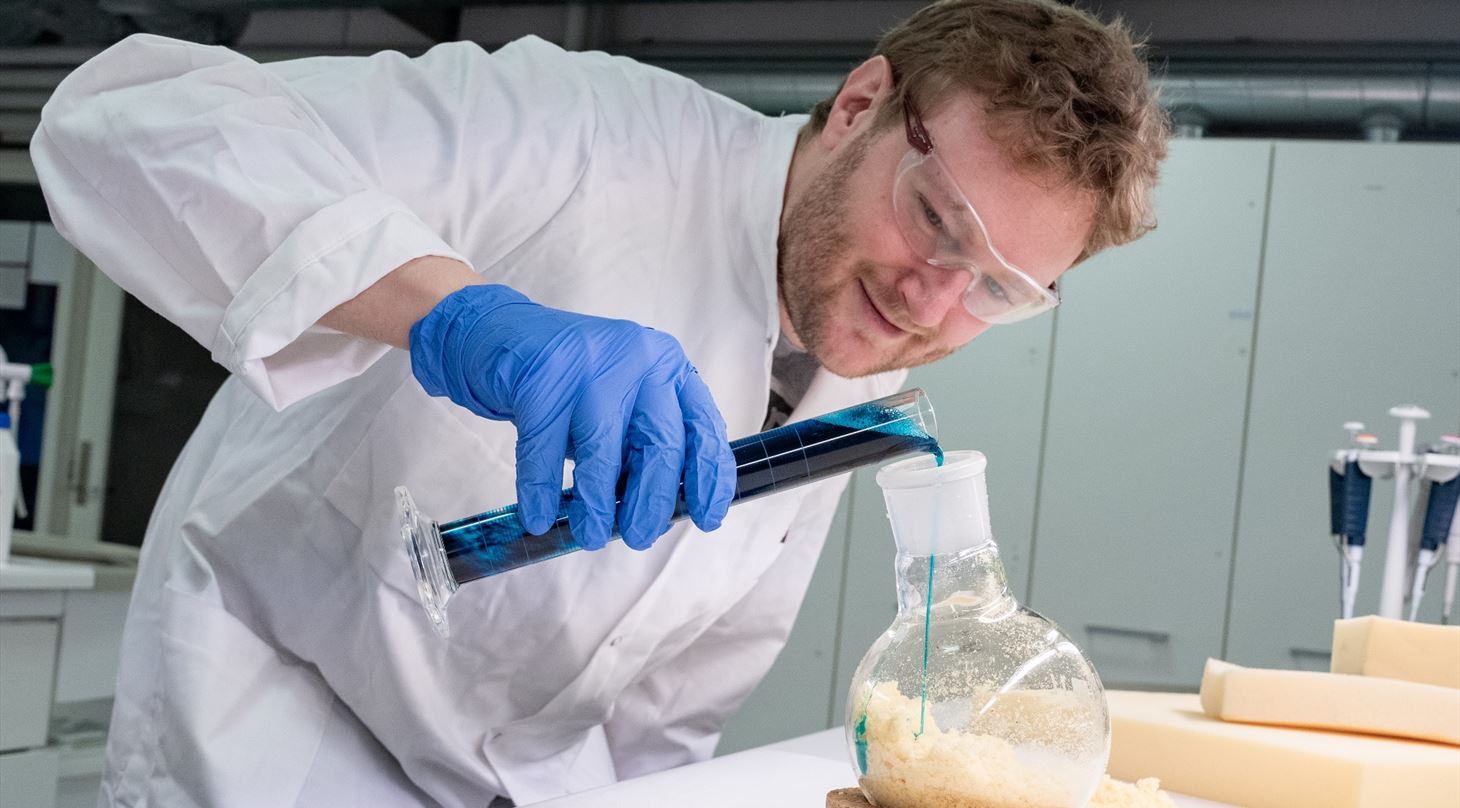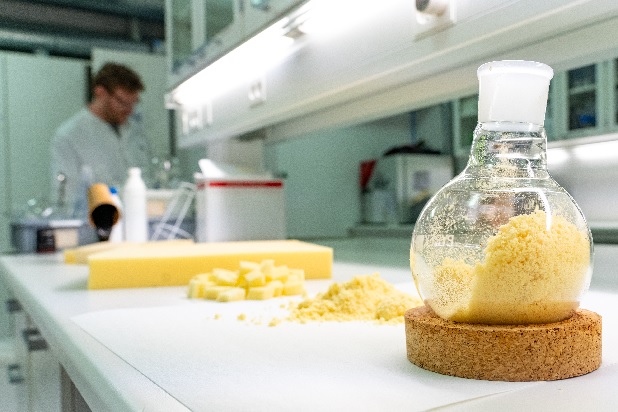
New Danish-developed technology to create circular solution for common type of polymer
New project aims to increase the recycling of plastic polymer from refrigerators, mattresses, shoes, and cars.
PURfection, a groundbreaking collaboration between industry and research, will further Danish-developed technology for recycling polyurethane. Due to the durability and high performance, the plastic polymer, polyurethane, is widely used in many different products, but after use, 95% end up being burned or landfilled. The Innovation Fund invests 12 million Danish kroner in the project.
Polyurethane – also known as PUR – is found in everything from refrigerators, shoes, and mattresses to cars. The versatile polymer type constitutes eight percent of the total plastic production worldwide but is very difficult to recycle. Now, several industry leading companies and knowledge partners are joining forces to enable PUR recycling, so it can replace fossil-based polyurethane.
Equivalent to removing the flour from a baked cake
“The ambition of PURfection is to create circularity for PUR waste, so it can be transformed into new polyurethane of the same high quality as the original. However, this is a complicated task, as it is roughly equivalent to removing the flour from a cake that has already been baked, so the flour can be reused for new baking. We believe that we can succeed in this by assembling a highly competent team that covers the entire value chain. When successful, the technology can both eliminate a highly accumulating and problematic waste source, reduce the use of resources from fossil sources, and reduce the CO2 footprint from the production of PUR”, says project manager Signe Grønborg from the Danish Technological Institute.
In addition to Danish Technological Institute, who both manages the project and contributes as a knowledge partner within the project, the consortium includes Aarhus University, the Danish companies PLIXXENT, DanFoam, FLSmidth, Tinby A/S, HJ Hansen and Eldan, as well as Copenhagen Municipality and the material science company DOW.
Developing groundbreaking technology
In PURfection, work continues on a remarkable technology that has previously been developed and patented by Aarhus University and Danish Technological Institute. Here, it was possible to replace new, virgin polyol with recycled polyol from a foam mattress. Polyols, along with isocyanate, are the two main components of polyurethane.
In the new project, the focus is on being able to reuse both of these two main components of PUR. This requires a complicated separation process of the two component types, but it will enable them to be used as new chemical building blocks across product types.
The project's focus is now also expanded to other PUR-containing products, including complex, mixed waste streams from, for example, discarded refrigerators and mattresses. The challenge here is that PUR has widely different chemical compositions from product to product. The next step will therefore be to be able to break down the polyol molecules from PUR into even smaller molecules, called monomers. This is an important step towards a raw material that is both pure and uniform across different types of PUR, so it can be used in various types of polyurethane.
Broad solution for PUR recycling
The Innovation Fund has invested DKK 12 million in the PURfection project, which aims to further develop and scale up the concept of the technology in all aspects of the value chain to a completly circular solution for PUR - from the production of PUR, collection and processing of PUR waste streams to the process of recreating basic chemicals from spent PUR. Therefore, it is essential that the project consortium encompasses all stages in the value chain for a circular solution in combination with leading researchers and technology developers. This involves representatives from the industry, including Dan-Foam, which produces mattresses and pillows made of PUR foam.
"Polyurethane is the main component in our mattresses and pillows. Therefore, the recyclability of that material plays a critical role in our green transition. By participating in PURfection, we gain access to innovation and knowledge throughout the PUR value chain. We believe that it will pave the way for a more direct and scalable solution, where we can recycle the building blocks of polyurethane into new quality products," says Tom Mikkelsen, Global Sr. Category Leader, Chemicals, at Dan-Foam.
To encompass a broad solution to the global problem of accumulating PUR waste, the project is working with two different strategies: One for the recycling of traceable materials, such as recycling of PUR trimmings directly in the company's own production. Another strategy is aimed at complex, mixed consumer waste containing polyurethane from many different products.
Both solutions are based on the overall principle of extracting chemical building blocks from PUR with the aim of eliminating a global problematic waste source and replacing virgin materials in new PUR products for the benefit of both the economy and the climate.

Fact box
Polyurethane is a versatile plastic polymer found in everyday items such as furniture upholstery, shoe soles, car interiors, refrigerator insulation, and foam mattresses. It is made by mixing two substances produced from crude oil, isocyanate, and polyol. By altering the composition and types of polyol and isocyanate, it can be made into soft foam or hard, solid material.
However, polyurethane also presents environmental challenges. It originates from crude oil and is not easily biodegradable or recyclable. As a result, PUR is currently only recycled to a small extent, and usually in low-value applications, known as downcycling, such as using it as filler in concrete. Overall, 95% of all PUR waste worldwide ends up being incinerated or placed in landfills.
Further information
Contact
- Signe Strange Grønborg, Project manager, Ph.D., Danish Technological Institute, tel. +45 72 20 13 32, mail: sgro@dti.dk.
Facts
- Innovation fund Denmark Investment: 12 million Danish kroner
- Total budget: 20 million Danish kroner
- Duration: 3 years
- Official title: PURfection - Polyurethane recycling - Favorable economic, circular and technical innovation
About the partners
Danish Technological Institute
Danish Technological Institute (DTI) is an independent not-for-profit organization, made up of specialists in a multitude of scientific fields. DTI's purpose is to strengthen Danish business in meeting the technological and business challenges of the future. Contact person: Signe Strange Grønborg, PhD, project manager, Danish Technological Institute, www.dti.dk
DanFoam
Dan-Foam is among the world's leading manufacturers of mattresses and pillows with manufacturing, sales and distribution worldwide. Dan-Foam is one of the leading users of polyurethane in Denmark and invests heavily in research and innovation to maintain their position as market leader. Contact person: Tom Mikkelsen, Global Sr. Category Manager, dan-foam.dk
Aarhus University
Professor dr. scientist. Troels Skrydstrup R. is an internationally recognized synthetic chemist who leads a research group at Aarhus University whose aim is to develop new chemical reactions for both building up and breaking down organic compounds. Contact person: Prof. Dr. Troels Skrydstrup, R. www.au.dk
FLSmith
FLSmidth is a complete technology and service provider for the full flow sheet to the global mining and cement industry. FLSmidth helps its customers improve performance, lower operating costs and reduce environmental impact. Contact person: Rasmus Windfeld, Press Manager, www.flsmidth.com
Tinby A/S
Tinby A/S, part of SP Group, is Scandinavia's leading sub-supplier of molded items in solid, foamed and flexible polyurethane and combinations thereof. Tinby A/S has in-depth knowledge of material technology used to develop customer-specific solutions. Contact person: Michael V. Therkelsen, sales and project manager,Tinby A/S, www.tinby.dk
PLIXXENT
PLIXXENT is Europe's largest independent polyurethane system house with 7 locations, including in Denmark. PLIXXENT supplies innovative polyurethane-based systems to a wide range of customers in various industries around Europe. With in-depth know-how in the development, production and processing of polyurethane, our experienced European team guides our customers from initial thoughts to after-sale support. Contact person: Erik Larsen, Head of R&D, PLIXXENT A/S, www.plixxent.com
DOW
Dow (NYSE: DOW) is a global materials science company, who`s ambition is to become the most innovative, customer centric, inclusive and sustainable materials science company in the world. It's portfolio of plastics, industrial intermediates, coatings and silicones businesses delivers a broad range of differentiated, science-based products and solutions for its customers in high-growth market segments, such as packaging, infrastructure, mobility and consumer applications. Dow operates manufacturing sites in 31 countries and employs approximately 37,800 people. Contact person: Andrea Benvenuti, Product R&D Director, DOW Polyurethanes, abenvenuti@dow.com, www.dow.com
HJ Hansen Recycling Group
H.J. Hansen Recycling group is one of the largest recycling companies in Europe and receives large quantities of scrap every year, which are primarily processed at the shredder plant in Odense. In addition, large quantities of refrigerated furniture are received daily for reprocessing, which must be environmentally treated correctly and sorted so that more than 80% is recycled. H. J. Hansen Recycling group continuously invests in new technology to be competitive and make better use of resources, to the benefit of the environment. Contact person: Lars Haunstrup, Production Director, H. J. Hansen Recycling Group A/S, www.hjhansen.dk/
ELDAN Recycling
ELDAN Recycling is a leading supplier of modern recycling equipment specialized for e.g. tires, cables and electronics. Eldan Recycling supplies equipment to new as well as experienced recycling companies worldwide, and helps its customers make recycling a successful and profitable business. Contact person: Jan Kjær, Product Manager, ELDAN RECYCLING A/S, www.eldan-recycling.com
Copenhagen Municipality
Copenhagen Municipality's Resource and Waste Plan 2024, Circular Copenhagen, works to ensure reuse and recycling of citizens' resources for the benefit of both the environment and the climate. Among other things, a large amount of PUR waste is generated every year in the Municipality of Copenhagen, i.e. in mattresses and upholstered furniture from the citizens. This is a fraction of plastic waste which, so far, cannot be set aside for recycling. There is therefore a need to collaborate on developing new treatment solutions.
Contact: presse@tmf.kk.dk, www.kk.dk